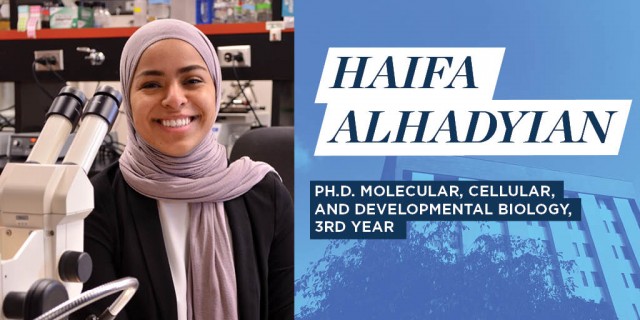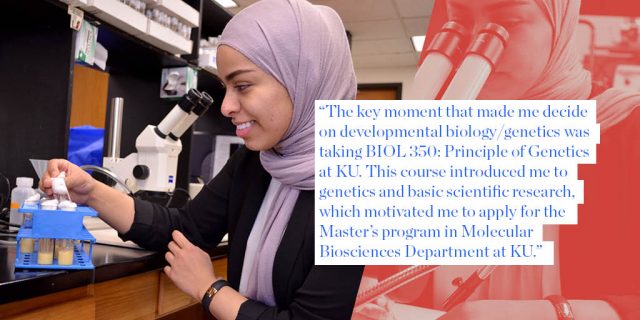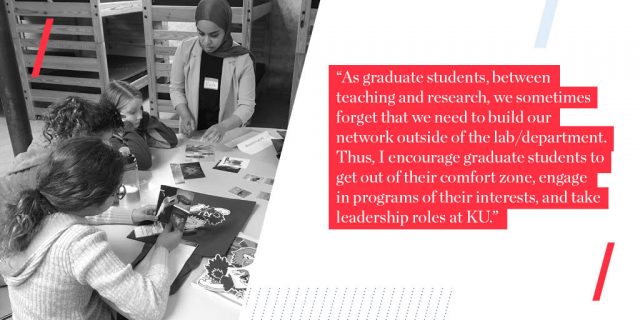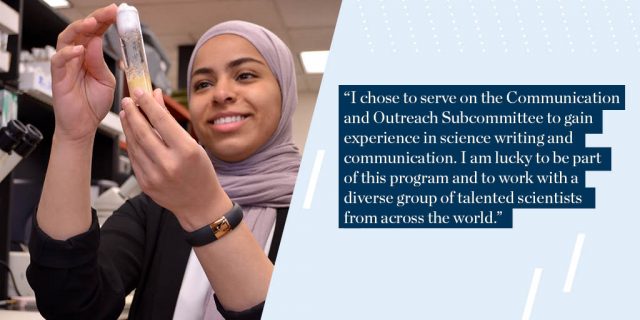
Program of study and year: Ph.D. candidate – Molecular, Cellular, and Developmental Biology – 3rd year
Hometown: Dammam City, Saudi Arabia
What are your research interests and why did you choose them? Was there a moment when you decided this is what you wanted to study? What was that journey like?
My research interests are centered around developmental biology and genetics. While in high school, biology was the subject that I enjoyed the most, so I got my Bachelor’s degree in Zoology. A year later, I was awarded the King Abdullah Scholarship, which allowed me to come to the United States to pursue a degree in biology.

Tell us what your Ph.D. thesis is in under 200 characters:
I am using a combination of genetics and cell biology to investigate how cells and tissues change shape during development using the fruit fly as a model system.
What is one thing you think everyone should know about your research project or research interests? This might be a commonly held belief that your research questions or complicates.
Basic science, including the use of model organisms such as flies and worms, is vital in advancing the scientific knowledge of how living organisms develop and survive. In fact, our understanding of many human diseases, including neurodegenerative disorders and developmental abnormalities, is facilitated by the studies conducted in model organisms. Thus, the impact of answering fundamental biological questions is extremely crucial in advancing our knowledge about both diseases and normal cellular processes that occur in our bodies everyday.
Where are you conducting your research?
I am conducting my research in the lab of Dr. Robert Ward in the Department of Molecular Biosciences.
What advice would you give new grad students as they develop their professional networks?

Give a shout-out to a professor, mentor, advisor, or someone at KU who has helped you.
My shout-out goes to everyone who has helped me along the way from fellow graduate students to professors, especially my Ph.D. advisor, Dr. Robert Ward, for supporting my research and encouraging me to explore outreach opportunities outside of the lab. I also would like to give a shout-out to Dr. Sonia Hall, a former Ph.D. student in our lab, for her support early in my graduate career.
What is the most valuable experience you have had while studying at KU?
Besides developing my career as a scientist, the most valuable experience for me is co-creating programs such as SEARCH Symposium and Jayhawks Breaking Barriers. These programs allowed me to serve in various leadership roles early in my career. Also, participating in outreach activities such as Kansas DNA Day and Girl Scouts STEM Expo helped me practice science communication in a more interactive environment.
Why did you get involved in Jayhawks Breaking Barriers and the Early Career Scientist-Communication and Outreach Subcommittee for the Genetics Society of America?
I wanted to get involved with the Jayhawks Breaking Barriers program to help undergraduate women see their potential and develop their leadership skills early in their scientific career. In 2017, I served as a Co-Chair of the Curriculum Committee and helped design the workshop series part of the program. Currently, I am a member of the Steering, Mentorship, and Research Committees of the new implemented course BIOL420: STEM Professional Development, which is more tailored for diversity in science.
Genetics Society of America (GSA) has a well-developed program for early career scientists to explore leadership roles and enrich their skills while building their professional network.

As a result of my appointment with GSA, I published my first blog post on Science Trends website and the second blog post will be published soon.
What do you plan to do after you graduate from KU?
My primary goal is to stay in academia and run my laboratory using model organisms to answer questions related to developmental biology. Thus, after graduating from KU, I will conduct postdoctoral research in related fields to gain more experience in scientific research and grant writing. Then, I will apply for faculty positions.
What motivates you?
Knowing that my work adds new knowledge to science, mentoring undergraduate students and helping them succeed, creating opportunities for others, and engaging with the public by participating in outreach activities.
Be like Haifa. Search for answers to the most important questions in your field, and stay on the lookout for leadership opportunities! For more information, visit the Department of Molecular Biosciences at the University of Kansas, as well as SEARCH Symposium, Jayhawks Breaking Barriers, Kansas DNA Day, Genetics Society of America (GSA) and Girl Scouts STEM Expo.